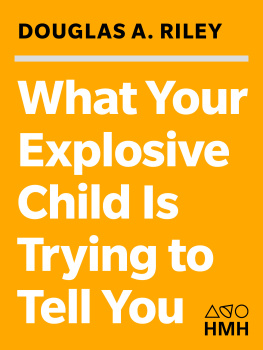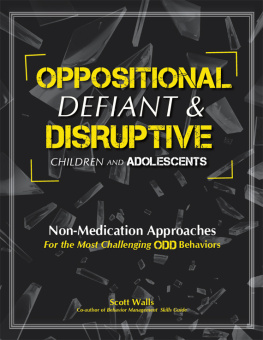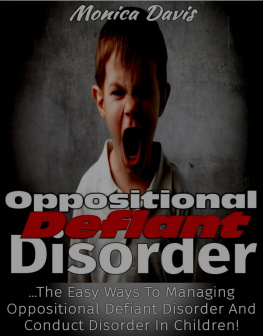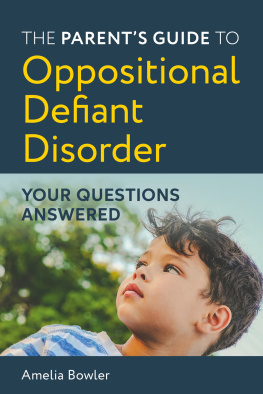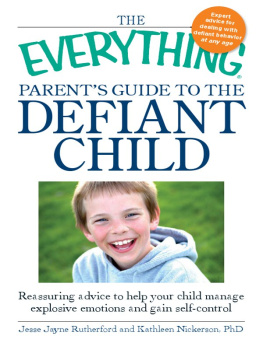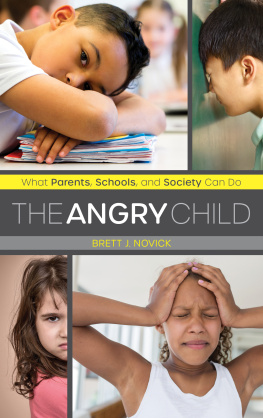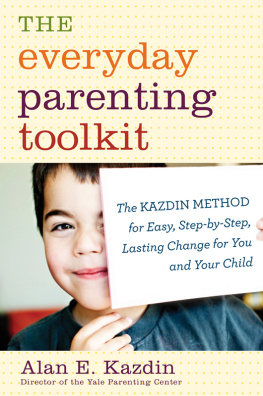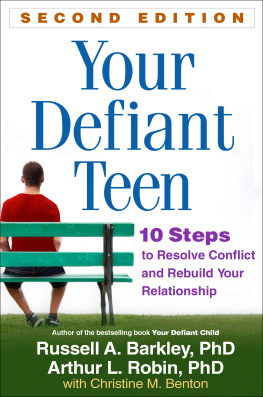The
Defiant
Child
A PARENTS GUIDE TO
OPPOSITIONAL DEFIANT DISORDER
Dr. Douglas Riley

Copyright 1997 by Douglas A. Riley
All rights reserved.
No part of this book may be reproduced in any
form or by any means without written permission from the publisher.
Published by Taylor Trade Publishing
4501 Forbes Blvd., Suite 200
Lanham, Maryland 20706
Distributed by National Book Network
The author gratefully thanks the American Psychiatric Association for permission to quote the passage from its Diagnostic and Statistical Manual of Mental Disorders, Fourth Edition that appears on .
Book design by Mark McGarry
Set in Nofret & Offirana Sans
Library of Congress Cataloging-in-Publication Data
Riley, Douglas.
The defiant child : a parents guide to
oppositional defiant disorder / Douglas Riley.
p. cm. Includes index
ISBN 978-0-87833-963-1
1. Oppositional defiant disorder in children Popular works.
2. Oppositional defiant disorder in adolescence Popular works. I. Title.
RJ50+.066R54 1997
618.92'89 dc21 97-24358
CIP
Printed in the United States of America
To the memory of my parents,
Nellie Cothran Riley and Basil Deward Riley.
Thank you for everything you taught me.
| CONTENTS |
| ACKNOWLEDGMENTS |
MANY PEOPLE deserve recognition for the contributions they have made to my understanding of children and adolescents. In a real sense they are partners in this book, and I am happy to have the chance to acknowledge them publicly.
The Department of Counselor Education and Counseling Psychology at Western Michigan University, where I received my graduate education, generously supported me over a number of years with grants and assistantships. I hope that this book reflects positively on the department.
My mentor at Western Michigan, Dr. Robert Betz, taught me to think about thinking. Although the mistakes in this book are most assuredly my own, his influence can be seen throughout the sections that emphasize that behavior cannot be changed without looking at the thought behind the behavior.
Several colleagues deserve mention. Dr. Charles Lowe, Dr. Tom Lanning, and John Vesey, MSW, have for years shared their insight into how children and adolescents, particularly those of the oppositional variety, behave and think. I am particularly indebted to Dr. Carolyn Wilson-Garrison and David Linn, ACSW, of Kalamazoo Clinical Associates, my former business partners, for their insight into analytic psychology and family systems theory. I also must take the opportunity to thank Dr. John Hogg and the physicians, nurses, and staff at The Childrens Clinic in Newport News, Virginia, for their support of my current endeavors.
I wish to thank Taylor Publishing. My editor, Jason Rath, approached the editing process with keen insight into psychological material. His questions and suggestions for clarification improved the manuscript in many ways.
I also wish to thank the parents of the children and teenagers I work with. Being allowed into the world of a child is a privileged position, and I have been honored over the years by parents who have extended their trust to me.
There is no possible way this book could have been completed without the forbearance and support of my wife, Debra Lintz-Riley, and my sons, Collin and Sam, the two best boys in the whole world.
| INTRODUCTION |
FOR JUST a few minutes, allow me to skip the technical and scientific descriptions of oppositional defiant disorder (well get to those in ). Chances are you already know what oppositional defiant disorder is like if you (1) were ever a child or teenager yourself, or (2) if you have a child or teenager living in your house. Oppositional defiant disorder is an exaggerated attempt on the part of a child or teenager to prove to you that you dont have any power over them. Most of us have acted this way before to one extent or another.
When mental health professionals talk about the term oppositional defiant disorder, the word of most concern to parents is typically disorder. It is a word fraught with negative connotations implying that the child has some sort of disease that parents are somehow responsible for. If I had the power to change the diagnostic labels we use in the field of psychology, I would change the term to oppositional defiant spectrum.
Why spectrum? The reason, simply enough, is that every child and teenager displays oppositional, defiant behavior at some point. Some display it to a degree that is more reasonably termed an occasional irritation than a disorder. Others, however, display it with such frequency and intensity that it keeps them in constant trouble with parents, teachers, and legal authorities.
There is good news implied in this notion of a spectrum. The best news is that oppositional behavior should rarely be viewed as a mental illness in the same way that schizophrenia, manic depression, or multiple personality disorder can be seen as mental illnesses. To put it another way, most of the people you meet who are schizophrenic are mentally ill and, barring medical miracles, are likely to stay that way. Few of the children and teenagers you meet who display oppositional behavior are mentally ill in the traditional sense of the word. In fact, under the right conditions and circumstances, they quickly change their behavior.
This book is my attempt to explain how parents can set up the right conditions and circumstances to help oppositional children and teenagers change their behavior. Be prepared for them to resist change and to ignore your attempts to use reason and logic to convince them. They believe that if they ignore you, they can just keep doing what they do. This book is about how you can talk to your oppositional child and what you can do once talk has failed.
Im optimistic about the outcome for oppositional children and teenagers once parents begin to use the methods Ive described in this book. Over the years Ive seen many of them change from surly and combative to cooperative and productive. Part of my reason for optimism is that oppositional children and teenagers are often quite bright, creative, and vigorous. These are characteristics that bode well for long-term success, and with the right kind of help, thats what your oppositional child can achieve.
| CHAPTER ONE |
Understanding the
Defiant Child
WHENEVER I think about the defiant child, I think about Tom. When I first met Tom, he was sixteen years old and had skipped most of the first semester of his sophomore year in high school. His father, a research scientist, informed me on the phone that Tom had driven most of his teachers close to assault with his mouth and his attitude. Although he was bright, he was headed down a path that would leave him lucky to graduate. He had just been arrested at a friends home, along with several other boys his age.
Soon after the friends parents left for dinner and a movie, a party had broken out. Tom and his friends got drunk and cranked up the stereo. A neighbor phoned in a complaint. When the police came, Tom grabbed one of them by the arm. He was charged with assault and resisting arrest and, from my viewpoint, was lucky to have run into a police officer not quick to respond with force.
When I walked out into my waiting room to meet Tom, I saw a tall, rangy, pimply faced young man sitting in a chair, reading one of the magazines on my coffee table. I introduced myself to him and asked him to come back to my office. He responded by refusing to look at me or speak and continued to read.


